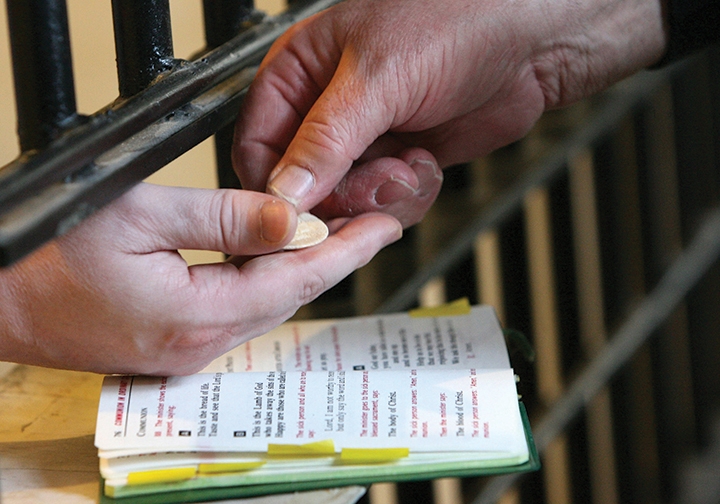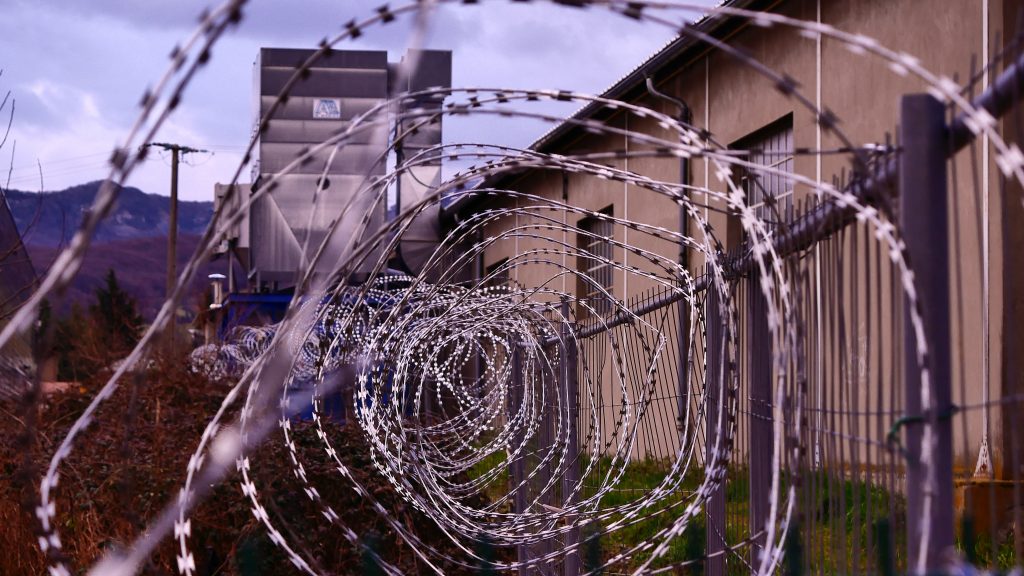
By Therese Horvat
Special to The Leaven
“Amid this place of Darkness,
in this square of deprivation,
seems I am a bit hope-less. . . .
As poorly I do, in trying to cope,
how is it I hear this rumor of hope?
When I should be most angry,
when my hate, I should not escape,
here on this insane and dangerous slope,
I hold dear . . . this
RUMOR OF HOPE”
A man once known as a hardened criminal wrote these lines of poetry. He had a record of holdups and shoot-outs. He had shot and killed two law enforcement officers.
The inmate became a regular at the weekly Catholic call-out sessions hosted inside the walls of the Lansing Correctional Facility by volunteers of Bethany Prison Ministry. He prayed with the group and listened to the Scriptures; the discussions mattered to him.
Still, he found it difficult to believe that God could or would forgive him. Until, eventually, the inmate began to absorb “this rumor of hope.” Sick and dying in the prison, he told the Catholic priest and the Bethany volunteer, “Maybe you are right. I have hope now that God will forgive me.”
For 28 years, hope has remained the strong undercurrent of the Bethany Prison Ministry. From the initial group of three founders, up to as many as 20 have volunteered and visited the prison each Wednesday evening for song, prayer, Scripture and story-sharing with inmates.

When a Catholic priest was among the volunteers, he celebrated Mass for the group. At one time or another, Catholic call-outs (as they are identified in the facility) occurred in the maximum, medium and minimum security sections of the prison.
Attendance was always highest in maximum, with 15 to 25 inmates participating.
Adapting to the pandemic
George Steger, one of the Bethany Prison Ministry founders, says that schedule came to a sudden halt in February 2020 with the onset of COVID-19. Virtual meetings with inmates were not an option.
When it became apparent that the group wouldn’t be going into the correctional facility for a while — and upon securing permission from prison officials — the volunteers began writing monthly morale booster greeting cards or letters to the inmates who had attended the Wednesday sessions.
Steger describes these as “attaboy” messages, designed to lift spirits and make the inmates smile. (Lansing Correctional Facility serves an all-male population.)
The messages might include corny jokes, Scripture passages or cartoons. Steger reviews the content to ensure compliance with prison requirements pertaining to exchange of information. According to the feedback Steger receives, the men appreciate the greetings and some post the cards and letters on the walls of their cells.
Serving a larger audience than its Catholic call-out participants, Bethany Prison Ministry also adapted during the pandemic to continue its annual Christmas program for indigent inmates at the correctional facility. Financial contributions from individuals and organizations went toward the purchase of soap, deodorant, shampoo, candy, cookies, coffee, snacks and personal care items.

Normally, several Sisters of Charity of Leavenworth (SCLs) would fill individual gift bags in an assembly line arrangement at the motherhouse. This year, with COVID restrictions, two Bethany volunteers packaged and delivered 300 bags to the correctional facility.
Prison staff distributed the beribboned bags to inmates who had no source of outside income other than the small amount received monthly from the state. This was the eighth year for the Christmas program. Steger perceives this as a shining light in the lives of the prisoner recipients.
Fellowship, conversion
Sister Mary Arthel Cline, SCL, another Bethany Prison Ministry founder, misses the Wednesday evening gatherings. She said, “We were there to share companionship and fellowship and not so much for proselytizing. “
Yet conversions have taken place through the years. Steger has served as sponsor for several inmates who became Catholic or were confirmed. These sacramental celebrations usually occurred in conjunction with an annual banquet with either Archbishop Joseph F. Naumann or Archbishop Emeritus James P. Keleher presiding.

A typical Wednesday Catholic call-out depended on the volunteer who was leading that evening’s session. Prior to COVID-19, a trend was developing of inmates taking the lead role. That often entailed stories of lives gone bad and gradual turning toward God and conversion.
“These were very moving sessions,” Steger recalled.
“Wednesdays were special. We got to be with people who were really happy to see us,” Sister Mary Arthel said. “Praying with and listening to these men, most of whom have so little to look forward to, I felt like I gained more than I gave each week.”
Among friends
Steger agreed.
“When you go in, you make friends. That’s the one thing that has kept me returning each week,” he said. “The call-outs were always somehow as rewarding for me as they were for the participants.”
Friendship and fellowship have remained at the heart of these gatherings. Volunteers routinely called inmates by their first names, whereas their last names were their prison monikers. Steger explained that the name “Bethany Prison Ministry” stems from the biblical story of Jesus who went to Bethany to visit his friends Lazarus, Martha and Mary.

A sense of friendship and fellowship likewise exists among the volunteers who number 13 today. United around a common purpose, these men and women from different walks of life are cohesive as a group. Bethany Prison Ministry volunteers include women religious, alumni of the University of Saint Mary, SCL Associates and individuals who just want to serve and do good.
Following each Wednesday session at the prison, the volunteers gathered at the SCL motherhouse for dinner and reflection on the evening. In a spirit of camaraderie but still adhering to COVID precautions, they continue to meet twice monthly via Zoom.
“We’re all friends,” Steger said, “and we miss seeing each other.”
Just as the inmates find hope through the intercession of Bethany Prison Ministry, the volunteers are holding out hope that the pandemic will end one day soon. And then, they can return inside the walls to meet, greet and pray with their friends and resume spreading “this rumor of hope.”






